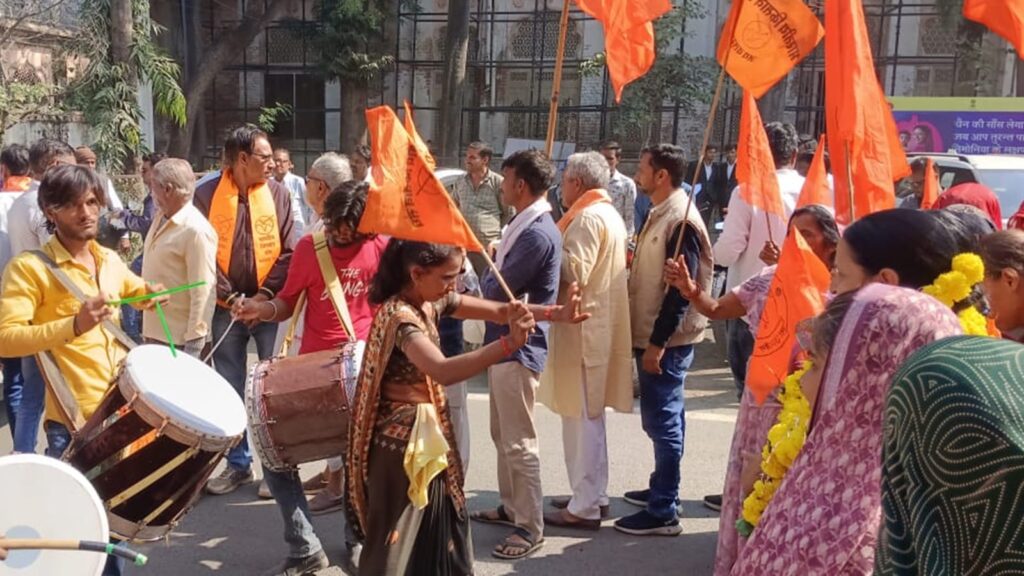What began as the Madhya Pradesh government’s marquee urban renewal project for the Simhastha festival in 2028 — the Kumbh Mela held in Ujjain every 12 years — had ended in an abrupt retreat for Chief Minister Mohan Yadav, marking the first major concession of his tenure.
Under pressure from RSS-affiliated farmers’ outfit Bharatiya Kisan Sangh (BKS) and backed by the Sangh leadership, the BJP government late on Monday rolled back its ambitious land pooling scheme, a project the CM once described as the “cornerstone of the transformation of Ujjain”, his home turf. The decision, following weeks of backchannel talks with Sangh affiliates, was taken following the BJP central leadership’s intervention. It came hours after the farmer outfits began preparing to hit the streets in protest.
Sources in the RSS, the BKS, and the local administration said the CM did not anticipate the opposition to intensify, having been assured by confidants in the local administration that land acquisition would proceed smoothly. Officials with prior experience in land acquisition initially downplayed discontent among farmers as a routine affair, it is learnt. “They told him protests were normal. By the time ground feedback reached Bhopal, the situation had hardened,” said a government source.
Senior BKS leader K Raghvendra Patel, however, said the CM did not engage with the state unit at all and “only spoke to central leaders”. “He met us and discussed the fine print for two hours only after Delhi approved the withdrawal,” he said.

The first rumblings of resistance were heard in February, when the BKS launched an andolan across the Malwa region, where it has over 8 lakh members and more than 4,000 gram samitis. By autumn, the organisation had mobilised tens of thousands through tractor rallies, village meetings, and rituals such as “Sadbuddhi Yagyas”.
Senior BKS functionaries said the matter escalated only after repeated letters to the CM went unanswered. By mid-October, a detailed ground report had reached both the RSS headquarters and party strategists in Delhi. “We told them that even if a quarter of this land was opened to construction, 12 years later there would be no ground left to conduct the Kumbh Mela,” said a senior RSS leader who was involved in the deliberations.
The file soon moved up the chain: first to BJP national general secretary (organisation) B L Santhosh, then to party president J P Nadda, and finally to Union Home Minister Amit Shah. According to those familiar with the developments, the CM was summoned to Delhi months ago for a review meeting, where Shah is learnt to have objected to several provisions of the plan and demanded “another presentation from Yadav with better alternatives”, said a senior BJP leader.
Why Malwa is important
Story continues below this ad
The Malwa region, with Ujjain as its spiritual and political nerve centre, has long served as the BJP’s ideological reservoir and electoral stronghold. From the Ram Mandir mobilisation in the late 1980s to farm-sector agitations after 2017, nearly every major movement shaping the party’s rural outreach has passed through these plains. The dense network of cooperative bodies, temple trusts, and Sangh-affiliated outfits such as the BKS provides the party with both organisational strength and ideological grounding.

The politically assertive farmer outfits in the region influence nearly two dozen Assembly seats across five districts. For Ujjain North MLA Anil Jain Kaluheda — 80% of the villages that would have been affected by the scheme are located in his constituency — the rollback will bring both relief and self-reflection. Praising the government’s reversal as a “good step”, he said, “But we failed to explain the scheme properly. I had over 30 meetings with farm unions and leaders, trying to show them how new roads and facilities could raise profitability. But they didn’t accept it.”

Jain said the CM pushed forward until the final weeks. “By October-end, all of us — MLAs, local officers, Mela authorities — told him (Yadav) clearly that the farmers are stiffening their opposition. Some suggested using force, but that would have meant losing the ground completely,” he said.
Several bureaucrats said the government’s reversal had more to do with opacity than policy flaws. After issuing the draft notification, officials failed to disclose land maps and benefit models, fuelling suspicions of hidden motives. “People kept asking for blueprints, which lands would be taken, how compensation would work, but we stalled for weeks. That delay cost us,” said a senior officer.
Story continues below this ad
The withdrawal was finalised late Monday during a two-hour meeting between senior BJP functionaries, BKS representatives, and top bureaucrats at the CM’s residence.
Hours earlier, BKS cadre were preparing to launch a “Dera Dalo, Ghera Dalo” protest at the Ujjain Collectorate, which may have paralysed the Malwa region. The BKS noted that “thousands of farmers from 18 districts were preparing to stay for an extended period with their own supplies”, and reports warned that thousands of tractors were ready to descend upon Ujjain, prepared for the long haul.


